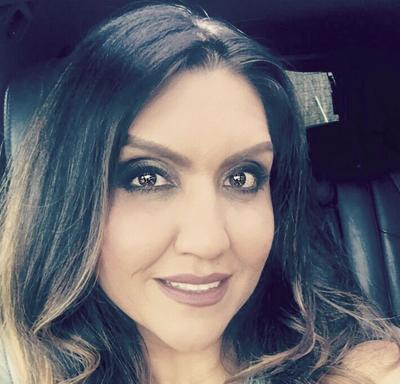Late last month, I saw a TikTok video that took my breath away. In it, a white-haired Ukrainian grandmother aimed an automatic rifle at the advancing Russian army. This, I thought, is why the world has rallied around the Ukrainian people. They are seeing what courage looks like in real time.
The video was powerful for another reason: It took me back to a moment four decades ago, when my own family fled the Russians as they invaded Afghanistan. At one point, a woman welcomed us into her modest home in the mountains for a bit of water and food.
When we asked why she had no blankets for the upcoming winter, she said she had set them on fire and thrown them upon the advancing Russian tanks. If only TikTok could have shown such stories to the world.
It’s why we cannot take the power of storytelling – which is really just free speech – for granted. We must value the democracy that allows us to speak, film, narrate and illuminate the truth. The alternative is Russia, where Facebook and a free press are forbidden. The alternative is Afghanistan of the 1970s, where neighbors couldn’t speak honestly with each other for fear of retribution.
Today, I’m an English professor, and I teach my students about the power of language. I teach them to wield stories as weapons of truth. I teach this because I know the alternative.
I was 8 when Afghanistan’s president, Mohammed Daoud Khan, was assassinated in a coup. Khan had sought to lessen the country’s dependence on Russia and build stronger ties to the West. But his successor, Communist politician Nur Mohammad Taraki, wanted to do the opposite; naturally, the Soviet Union supported Taraki’s rise to power.
With a new government in place, Afghans were suddenly divided, forced to choose between the old regime and the new. The government offered people incentives to spy on their neighbors; if they reported someone for anti-communist behavior, they were rewarded.
My father learned of the coup while working in the restaurant industry in America. When he arrived home, all eyes turned toward our family. I had always felt safe in our community. Now as suspected Western sympathizers, we couldn’t trust anyone. Not even Madina, my best friend and next-door neighbor. Or my uncle, who showed up one day asking too many questions.
As the months passed, opponents of the new communist government launched an uprising and civil war broke out. My family and I watched one president after another fall from power, until Christmas Eve 1979, when the Soviets finally arrived with 30,000 troops.
Gunfire pulled me from sleep. Over the tall mud walls surrounding our home, we saw men, women and children running and screaming as Soviet soldiers gunned them down. My mother ordered us to spread out and sleep in different corners of the house in the hopes that at least some of us would survive the bombings and rocket strikes that occurred every night.
The next day, the streets of Kabul were different. Soviet war tanks patrolled the city, their weight breaking the pavement. At my sisters’ school, the principal led a protest against the invasion. One of their classmates, a beautiful and vibrant girl, courageously held the Afghan flag over her head – and was shot in the chest by Russian soldiers.
A few months later, on a warm summer morning in 1981, around 2 a.m., my family did what millions of Ukrainians are doing now: We fled for our lives across the border. We took almost nothing with us. As our car drove away, I said a silent goodbye to 11 years of my life. Then I turned forward, to face an uncertain future.
For the next decade, the Afghans fought the Soviets to defend their homeland, their culture, their families and Islam. Russia was a superpower, and the playing field was not fair. But the Afghans were fearless and innovative, making grenades from benzine and empty bottles. On Feb. 15, 1989, the defeated Soviet Union finally withdrew its troops.
Now, 33 years later, Afghans like me are dismayed to see another Russian invasion – not just because we, too, were victims of the Russians, but because what Putin is doing to Ukraine isn’t so different from what the Taliban is doing in Afghanistan.
Both are dictatorships with an insatiable hunger for oppression. Both are trying to silence the voices of ordinary people, as the Taliban just did by restricting girls’ education past the sixth grade. But in our interconnected world, they cannot succeed. Ukrainians and Afghans alike are sharing their stories, making the struggle for democracy and human rights known, seen and felt.
It shouldn’t take a war to help us appreciate the power of storytelling. Especially here in the United States, we too often forget why speech matters. It’s not simply about the freedom to say whatever we want. It’s about building empathy and connection – the opposite of dehumanization and destruction. I’ve experienced what happens when our voices are taken away. But I also know the best way to protect our voices is to use them.
Sophia Aimen Sexton is a professor of English at Northern Virginia Community College’s Annandale Campus.



(4) comments
The author say Facebook and a free press are forbidden in Russia. I wonder what her thoughts are on the “free” press and Facebook in America, which actively suppress the Truth when it is inconvenient to their political narrative? And the current absurd Democrat talking point that free-speech needs to be suppressed to “save” Democracy. They really mean the Truth must be suppressed to save their power & control, because The People are waking up to their lies and deception. Now THAT is the wokeism that America Needs! Not that Evil Marxist kind.
Dude.
You have no idea what you are talking about and continue to throw stupid lingo around that is prevalent in your social circles.
Shut your entitled mouth and stop spreading crazy, conspiracy-laden ideas.
Take a Hike Comrade. Truth is not a conspiracy. If my comment had no merit, you would not respond.
To quote a movie, you can't handle the truth. The free press is not suppressing the truth unlike Fox which knows the truth but chooses not to share it.
Trump didn't get banned from Twitter for telling the truth; nobody could accuse him of that.
Welcome to the discussion.
Log In
Keep it Clean. Please avoid obscene, vulgar, lewd, racist or sexually-oriented language.
PLEASE TURN OFF YOUR CAPS LOCK.
Don't Threaten. Threats of harming another person will not be tolerated.
Be Truthful. Don't knowingly lie about anyone or anything.
Be Nice. No racism, sexism or any sort of -ism that is degrading to another person.
Be Proactive. Use the 'Report' link on each comment to let us know of abusive posts.
Share with Us. We'd love to hear eyewitness accounts, the history behind an article.